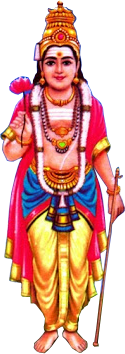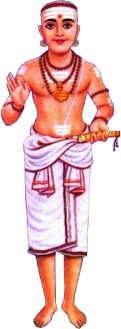63 Nayanmargal
- Adipattha Nayanar-அதிபத்த நாயனார்
- Aiyadigal Kadavarkon Nayanar-ஐயடிகள் காடவர்கோன் நாயனார்
- Amaraneedi Nayanar-அமர்நீதி நாயனார்
- Anaya Nayanar-ஆனாய நாயனார்
- Appuddi Nayanar-அப்பூதி அடிகள் நாயனார்
- Arivattaya Nayanar-அரிவாள் தாய நாயனார்
- Chandesvara Nayanar-சண்டேசுவர நாயனார்
- Cheraman Perumal Nayanar-செராமான் பெருமாள் நாயனார்
- Dandi Adigal Nayanar-தண்டியடிகள் நாயனார்
- Enadinatha Nayanar-ஏனாதிநாத நாயனார்
- Eripatha Nayanar-எறிபத்த நாயனார்
- Eyarkon Kalikama Nayanar-ஏயர்கோன் கலிக்காம நாயனார்
- Gananatha Nayanar-கணநாத நாயனார்
- Idangazhi Nayanar-இடங்கழி நாயனார்
- Ilayankudi Mara Nayanar-இளையான்குடி மாறநாயனார்
- Isaijnaniyar-இசை ஞானியார்
- Iyarpahai Nayanar-இயற்பகை நாயனார்
- Kalia Nayanar-கலிய நாயனார்
- Kalikamba Nayanar-கலிக்கம்ப நாயனார்
- Kanampulla Nayanar-கணம்புல்ல நாயனார்
- Kannappa Nayanar-கண்ணப்ப நாயனார்
- Karaikal Ammaiyar-காரைக்கால் அம்மையார்
- Kari Nayanar-காரி நாயனார்
- Kazharsinga Nayanar-கழற்சிங்க நாயனார்
- Kochengat Chola Nayanar-கோச்செங்கட் சோழ நாயனார்
- Kootruva Nayanar-கூற்றுவ நாயனார்
- Kotpuli Nayanar-கோட்புலி நாயனார்
- Kulacchirai Nayanar-குலச்சிறை நாயனார்
- Kungiliya Kalaya Nayanar-குங்குலியக் கலய நாயனார்
- Maiporul Nayanar-மெய்ப்பொருள் நாயனார்
- Manakanchara Nayanar-மானக்கஞ்சாற நாயனார்
- Mangayarkarasiyar-மங்கையர்க்கரசியார்
- Munaiyaduvar Nayanar-முனையடுவார் நாயனார்
- Murkha Nayanar-மூர்க்க நாயனார்
- Murthi Nayanar-மூர்த்தி நாயனார்
- Muruga Nayanar-முருக நாயனார்
- Nami Nandi Adigal-நமிநந்தியடிகள் நாயனார்
- Narasinga Muniyaraiyar-நரசிங்க முனையரைய நாயனார்
- Nesa Nayanar-நேச நாயனார்
- Ninra Seer Nedumara Nayanar-நின்றசீர் நெடுமாற நாயனார்
- Perumizhalai Kurumba Nayanar-பெருமிழலைக் குறும்ப நாயனார்
- Pugal Chola Nayanar-புகழ்ச்சோழ நாயனார்
- Pugazh Tunai Nayanar-புகழ்த்துணை நாயனார்
- Pusalar Nayanar-பூசலார் நாயனார்
- Rudra Pasupathi Nayanar-உருத்திர பசுபதி நாயனார்
- Sadaya Nayanar-சடைய நாயனார்
- Sakkiya Nayanar-சாக்கிய நாயனார்
- Satti Nayanar-சத்தி நாயனார்
- Seruthunai Nayanar-செருத்துணை நாயனார்
- Sirappuli Nayanar-சிறப்புலி நாயனார்
- Siruthonda Nayanar-சிறுத்தொண்ட நாயனார்
- Somasira Nayanar-சோமாசி மாற நாயனார்
- Sundaramurthi Nayanar-சுந்தரர்
- Tirugyanan Sambandar-திருஞான சம்பந்த மூர்த்தி நாயனார்
- Tiru Kurippu Thonda Nayanar-திருக்குறிப்புத் தொண்ட நாயனார்
- Tirumula Nayanar-திருமூல நாயனார்
- Tiru Nalai Povar Nayanar-திருநாளைப் போவார் நாயனார்
- Tiru Neelakanta Nayanar-திருநீலகண்ட நாயனார்
- Tiru Neelakanta Yazhpanar-நீலகண்ட யாழ்ப்பாண நாயனார்
- Tiru-Navukkarasar Nayanar (a) Appar-திருநாவுக்கரசு நாயனார்
- Tiruneelanakka Nayanar-நீல நக்க நாயனார்
- Vayilar Nayanar-வாயிலார் நாயனார்
- Viralminda Nayanar-விறல்மிண்ட நாயனார்
Kannappa Nayanar
Nagan was the king of hunters at Uduppur in Pottapi Nadu. His wife was Tattai. They were great devotees of Lord Subramanya. By His grace, they had a child, after a long time. It was very heavy: so, they named him Tinnanar.Tinnanar was Arjuna in the previous birth, according to Tiru Kalahasthi Puranam.When he went to worship Siva, to get Pasupatha Astra, and when the Lord came to him as a hunter, Arjuna did not recognise Him. So, he had to be born as a hunter again and adore the Lord, before attaining Final Liberation.
Tinnanar was educated according to the hunters customs. He became a good archer. Even when he was young, his father retired, and crowned him king. Though he was a hunter and carried on hunting as his Dharma, Tinnanar was full of love and would not kill young ones, females, diseased animals, etc. Spiritually, he had already killed the animals within himself, viz., lust, anger, greed, vanity, etc.
One day, Tinnanar went out hunting. A pig escaped from its net and was running away. Tinnanar pursued it accompanied by two others, Nanan and Kadan. The pig was tired and stood near a tree. It was quickly killed by Tinnanar. They were tired, too, and thirsty. They proceeded towards the Ponmukali. Tinnanar wanted to climb the nearby mountain. Nanan, too, volunteered to follow him, saying that on that, the Kalahasthi hill, there was Lord Kudumithevar (God with a Tuft). Kadan was busy cooking the pork.
Even when he began to climb the hill, there was a definite change coming over Tinnanar, owing to past Samskaras. He felt that a great burden was being lifted off his shoulders. He was losing body-consciousness. As he saw the Lord there, he felt supreme love surging in his heart. He embraced the Lingam and kissed It. He began to shed tears of joy. He felt that the Lord was lonely there, and that he should thenceforth remain with Him. Again, he thought that the Lord might be hungry. Though he was reluctant to leave the Lord alone, he quickly came down the hill to fetch some food for the Lord. He took the best pieces of the pork, tasted them and ear-marked the very best for Him. In the mean time, he gathered from Nanan that the Lord was worshipped daily with water, flowers, etc, before the food was offered to Him. So, he began to collect the other articles of worship. He filled his own mouth with water from the river. Flowers, he gathered and wore them on his head! He took the pork, bow and arrow and went up the hill again, alone this time.
At the temple, Tinnanar poured from his mouth, the water that he had brought for His worship. That was his Abhishekam. Then he decorated the Lingam with the flowers he had brought on his own head. This was his Archana. He then placed the pork before the Lord. He went out and stood guard for Him, at the entrance, lest some wild animals should hurt Him. In the morning again he went out to hunt and bring fresh food for the Lord.
In the mean time, Nanan and Kadan worried about the change that had come over Tinnanar (which they thought to be madness). They went and reported the matter to Tinnanars parents. They came and tried, in vain, to take him back. They, too, went away.
When Tinnanar left the temple in the morning to get food for the Lord, Sivagochariar, the temple priest, came there for the usual orthodox worship. He was horrified at the desecration that some unknown person had done in the temple. He was well versed in the Agamas (rituals of Siva-worship). He performed the necessary purificatory rites and took bath again and began his formal worship. He brought water in a holy pot, with a bandage around his own mouth, lest the breath of his mouth should pollute it. He brought fresh flowers in a holy basket. He brought fruits and sweets, newly made and unpolluted by anyone tasting it, before the Lord for being offered to Him. He went home after the worship.
Tinnanar returned with fresh meat. He removed the priests decorations, and did the worship in his own way, and then as usual, stood guard at the entrance.
This went on for five days. The priest was greatly upset about the desecration of the holy place. He appealed to the Lord to stop it. Lord Siva wanted to show to Sivagochariar the nature of Tinnanars supreme devotion. He commanded him in a dream, to hide himself behind the Lingam, when Tinnanar went to the temple the next day, and watch what took place.
On the sixth day, Tinnanar went out as usual for getting the Lords food. While returning, he saw many ill omens, which made him feel that something had happened to the Lord: he was so unconscious of himself, that he did not think that something could happen to him. He ran towards the Lord. He was grieved to see blood issuing from the Lords right eye. The articles he had brought for the worship dropped from his hand. He wept bitterly. He could not find who had done this to the Lord. He treated the eye with herbs he knew of. Still the bleeding did not stop. A simple idea occurred to him: flesh for flesh. At once, with his own arrow, he took out his own right eye, and fixed it over the right eye of the Lord. The bleeding stopped. He was very happy. When he was dancing in ecstasy, he noticed that the Lords left eye had begun to bleed. But, he had already found out the remedy. There was only one problem: how to locate the eye of the Lord, when his own eye had been pulled out. So, Tinnanar planted his foot at the place where the Lords left eye was on the Lingam, and began to pull his left eye out, with his arrow.
At once, Lord Siva caught hold of his hand and said: My dear child, Kannappa! Stop plucking your eye. The Lord repeated the word Kannappa thrice. Kannappar was thrice blessed. Tinnanar became Kannappar, because he gave his own eye to the Lord. Lord Siva took him with both Hands, and kept him on His right side. Kannappar regained his vision and lived as god himself. Sivagochariar understood the true nature of devotion.
This story has an esoteric meaning, too. Nayanar had conquered all other evils: but, Anava Malam or egoism had to be killed, too. The wild pig represents this. Supreme Bhakti dawned, the moment this was killed. In its chase, the seeker is accompanied by good and evil (the two hunters Nanan and Kadan). Nanan (good) described the glory of the Lord to him: Nanan represents good Samskaras. Kadan (the evil) had to be left behind. The aspirant with good Samskaras, goes to His Presence. But, when he has to attain God-realisation, even this has to be renounced. Hence, Nayanar, when he went to worship Him, went alone. Nayanars parents (the hidden good and evil tendencies and worldly desires) tried but failed to take him away from God. The Lord asked the priest to hide behind Him, while Tinnanar was in front: this means, true Bhakti is far superior to mere ritual. Tinnanars readiness to pluck out his own eyes for His sake is total self-surrender or Atma-Nivedan, the highest peak of devotion which immediately reveals the Lord in all His glory.









